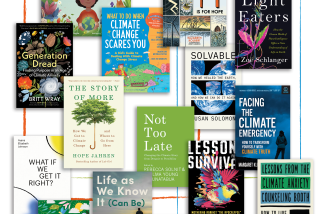Editorial: Why we wrote our series on climate change

The Los Angeles Times editorial board has been writing about the climate change debacle for years. We’ve written about its relationship to the intensified California wildfires, about the importance of moving to sustainable energy sources, about the importance (and, at the same time, the insuffiency) of the Paris accords, about the ongoing efforts to reduce greenhouse gas emissions in California, the United States and around the world. We’ve routinely sided with scientists over deniers, and we’ve consistently called for greater action to address the looming catastrophe.
Our three-part series on climate change
Part 1: Climate change is already here. 2020 could be your last chance to stop an apocalypse
Part 2: Wealthy countries are responsible for climate change, but it’s the poor who will suffer most
Part 3: Surviving climate change means an end to burning fossil fuels. Prepare yourself for sacrifices
Since the election of Donald Trump in 2016, however, the situation has gotten worse. Climate-related events have intensified, becoming increasingly difficult to ignore or deny. But the Trump administration has ignored and denied them anyway, while systematically weakening the U.S. policies designed to combat the problem.
It seemed to us that the time had come to take a broader look at the issue, one that stepped back and laid out our views in a more comprehensive, less piecemeal way than usual. And to register in a bigger and more pointed manner our profound concern about the future of the planet and the seeming inability of world leaders to respond with appropriate seriousness.
The first installment of the series lays out the scope of the problem, and argues that President Trump’s policies are making a very bad situation worse. The second addresses the responsibility of developed countries to the developing world. The third focuses on what needs to happen next to reduce our greenhouse gas emissions.
Climate change can be a depressing subject. We have tried to express a realistic balance of frustration, despair and hope. Our goal is to have readers come away with a renewed concern about the seriousness of the problem and a better sense of what needs to be done.
More to Read
A cure for the common opinion
Get thought-provoking perspectives with our weekly newsletter.
You may occasionally receive promotional content from the Los Angeles Times.










